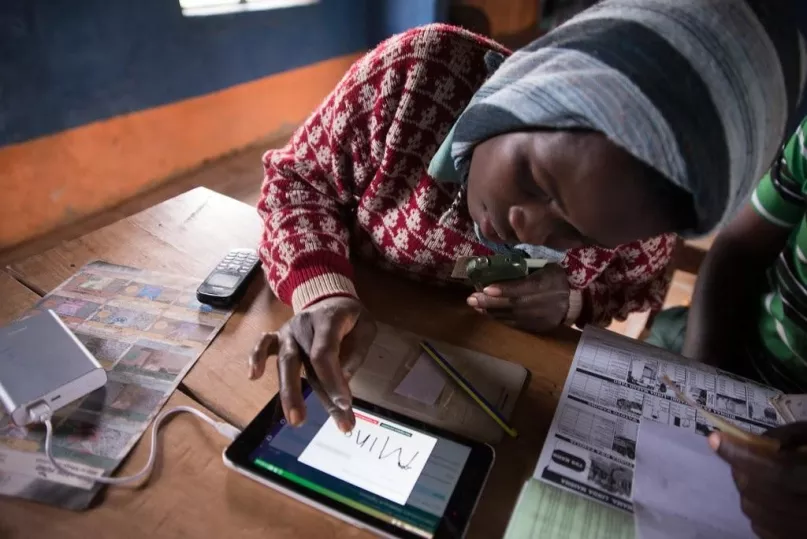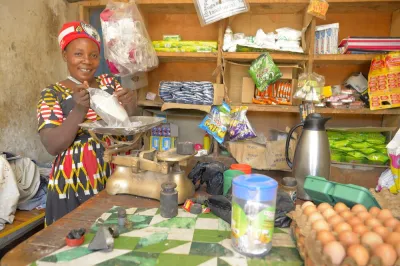How Can Financial Technology Serve Smallholder Farmers?

As financial service providers (FSPs), we at Propagate Coalition have witnessed an important increase in innovation for digital products and services aimed at smallholder farmers in the last decade. Digital delivery channels bridge geographic distances and circumvent other obstacles to deliver financial, informational and market facilitation services to millions of rural farmers around the world.
The current COVID-19 crisis has highlighted the value of digital products and mobile money in enabling FSPs to cope with and respond to major disasters. We are seeing that if our partner operations are highly digitized, with branch usage being low, they will likely be in a better place to weather the crisis. In the longer term, COVID-19 will no doubt accelerate the transition to digital finance.
During our last meeting before the crisis began, we brought together a number of fintech stakeholders to discuss solutions for supporting the smallholder sector and the challenges and opportunities in developing successful fintech products. After the meeting, we followed up with two of the participants, Musoni and Field Buzz, to help us dive deeper into the ideas discussed and we share their thoughts in this blog post.
Musoni is a cloud-based core banking system designed for microfinance institutions in emerging markets to help them improve efficiency, reduce costs and expand outreach into the rural areas where the majority of the unbanked live. Besides the core banking functionality, Musoni includes integration with multiple mobile money transfer services, an SMS module for the sending of automated payment reminders, a tablet app for loan officers to capture data offline, a mobile banking app for clients, and Credit Reference Bureau integrations to improve lending decisions.
Field Buzz (Field Information Solutions) specializes in creating mobile apps and management information solutions for organizations that previously did not have access to appropriate IT systems or computing devices. The software helps organizations manage their field operations with smartphones and web, bringing transparency and efficiency to the “last mile” in emerging markets. Their typical customers are businesses and NGOs with dispersed rural networks and mobile staff, especially in developing countries.
Three challenges in serving smallholder farmers
Our discussions with fintech providers identified three main challenges that FSPs experience in trying to reach smallholder farmers with appropriate financial solutions:
- Cost: High costs associated with maintaining a network of geographically dispersed smallholder farmers living in rural areas.
- Data: Lack of relevant and reliable information to analyze the repayment capacity of smallholder farmers.
- Risk: Irregular and unpredictable incomes of smallholder farmers.
Fintech solutions to address these challenges
Digitizing operations, which increases efficiency and reduces operational costs, is one of the key solutions that fintechs can offer to address the issue of high costs associated with serving rural areas. Musoni has been able to create economies of scale by partnering with more than 70 FSPs which serve over 1.35 million mobile money customers, 60 percent of whom are based in rural areas. The Musoni SMS module helps to reduce costs by allowing organizations to maintain communication with customers through chat messages instead of relying on field officers. Messages can include notifications of new products, practical advice on crop management and payment reminders. For those tasks which must be done by field officers, the Musoni Digital Field Application helps them work faster and more efficiently as they can manage client registrations, loan applications, customer surveys, repayments and deposits in both online and offline modes.
Scoring models can help to overcome challenges associated with the lack of data, as well as reduce the burden of financial risk. For example, Musoni has developed scoring models to predict crop yields and assess repayment capacity. This data can then be used in their core banking system to build flexible and irregular repayment schedules that fit farmers’ likely cash flow patterns. Field Buzz is also developing a model which uses historical transaction data to identify relevant patterns for creditworthiness and risk, which can help automate certain decisions such as loan approvals. With the Field Buzz app, farmers are individually registered in the system and given membership cards with a unique code that is scanned to identify them through their smartphone camera. All of their transactions and activities, including loan requests, crop collections, visits to farms and training sessions, are then stored digitally to help FSPs with financial decision-making.
Partnerships are another way that fintech providers are helping to solve the issue of lack of data. Field Buzz is developing three-way partnerships between FSPs, agribusinesses and technology providers. Agribusinesses have deep networks in rural areas, economic relationships with many smallholders, and a staff of agronomists or other forms of technical support for farmers. But the information they gather is typically offline and not accessible to FSPs. The technology provider remedies that by setting up a system to record data on the interactions between agribusinesses and farmers in a digital format. Over time, as these transactions start to create track records for each farmer, they can be used by the partner FSPs to assess key criteria for assessing individual farmers’ risk and economic capacity.
How are fintech firms helping FSPs to serve smallholders in the context of COVID-19?
The COVID-19 pandemic has disrupted how FSPs interact with their customers, including smallholder farmers who play a major role in ensuring food security during this crisis. Most of the challenges faced by FSPs are related to cash flow shortages stemming from irregular customer deposits and repayments. In countries where clients have been offered moratoriums on their loan repayments, Musoni has been working with their partners to create solutions that help with bulk rescheduling.
In cases where FSPs rely on field workers to deliver services to populations living in rural areas, fintech firms have noticed a decrease in the use of some of their applications, and have rapidly changed their product offering to solve some of these challenges. For example, Musoni has launched a new version of their Digital Field Application which includes greater offline functionality to help field officers work from home more effectively.
As the situation evolves and governments begin to lift restrictions on movement, fintechs expect that FSPs will resume their field operations and return to the use of applications that were initially affected by government lockdowns.
What do you think?
The Propagate Coalition recognizes that fintech providers have great potential to help FSPs overcome the challenges they face in supporting smallholder farmers by lowering transaction costs, improving data collection and contributing to better financial literacy levels through tailored information and support. We invite the fintech community, as well as any other contributors, to share their thoughts and experiences with us. Join the debate by contributing to the comments section below.


